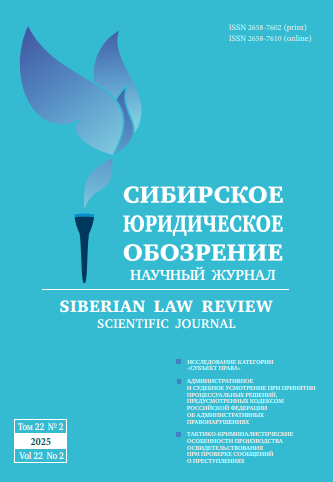Administrative and Legal Regulation of the Protection of Minors’ Rights in Their Use of the Internet (Case Study: The People’s Republic of China)
- 作者: Solomatina E.A.1
-
隶属关系:
- Kikot Moscow University of the Ministry of Internal Affairs of Russia
- 期: 卷 22, 编号 2 (2025)
- 页面: 227-239
- 栏目: PUBLIC LEGAL (STATE LEGAL) SCIENCES
- ##submission.datePublished##: 07.07.2025
- URL: https://journal-vniispk.ru/2658-7602/article/view/343636
- DOI: https://doi.org/10.19073/2658-7602-2025-22-2-227-239
- EDN: https://elibrary.ru/CSFMWW
- ID: 343636
如何引用文章
全文:
详细
The international community remains deeply concerned about the effects of the Internet – and certain types of online content – on the mental and physical health of minors. This concern is reflected in statements by government officials, academic institutions, school communities, psychologists, parents, and business representatives working to create safe digital environments for children. Across national and international platforms, both official and unofficial voices consistently acknowledge the universal threat posed by the Internet to children, regardless of their country of residence. The ongoing expansion of digitalization, driven by rapidly evolving technologies, has necessitated the development of legal frameworks and mechanisms to protect minors online. This evolution has also encouraged closer cooperation among countries and fostered trends toward the integration of national legal approaches, spurred by shared concern about the impact of digital technologies on children and a common search for effective legal safeguards. Comparative legal analysis enables scholars and policymakers to identify both commonalities and distinctions in administrative and legal approaches to safeguarding minors online. It also allows for the consideration of potential legal transplants and the identification of global and national trends in this area. This article explores the experience of the People’s Republic of China (PRC) in protecting the rights of minors in the digital environment, focusing in particular on measures adopted within the administrative and legal regulation of cyberspace. China’s executive authorities have actively pursued administrative regulatory mechanisms to limit, among other things, the amount of time minors spend on digital devices – especially online games. Nonetheless, the key question remains: How effective are these regulatory measures in practice? Drawing on recent developments in the PRC’s administrative and legal strategies for protecting minors’ rights online, and informed by the views of several experts, the Author concludes that a comprehensive and scientifically grounded, interdisciplinary approach is essential to address the challenges posed by digital exposure and to ensure the effective protection of children’s rights in cyberspace.
作者简介
Ekaterina Solomatina
Kikot Moscow University of the Ministry of Internal Affairs of Russia
编辑信件的主要联系方式.
Email: katesolo@yandex.ru
ORCID iD: 0009-0001-1195-274X
Associate Professor of the Department of Administrative Law, Candidate of Legal Sciences, Associate Professor
俄罗斯联邦, 12 Akademika Volgina str., Moscow, 117997参考
- Perić N. The Impact and Implementation of Digital Media on Children’s Upbringing and Education. In: Bulatovic L. (Ed.). Digital Spaces - Challenges and Expectations. Beograd: FMK Publ.; 2019. P. 141-165.
- Fortova L. K., Matyukhina O. S. Research of Problems of Virtual Addictions Among Minors in Russian and Foreign Science. Mir Nauki, Kultury, Obrazovaniya. 2018;2:54-57. (In Russ.)
- Jiang Q., Chen Z., Zhang Z., Zuo C. Investigating Links Between Internet Literacy, Internet Use, and Internet Addiction Among Chinese Youth and Adolescents in the Digital Age. Frontiers in Psychiatry. 2023;14. https://doi.org/10.3389/fpsyt.2023.1233303
- Pikover A. V. Information and digital sphere. In: People’s Republic of China: Politics, Economics, Culture. 2022. Moscow: Institute of China and Contemporary Asia Publ.; 2023. P. 203-216. (In Russ.)
- Lobach D. V., Smirnova E. A. Legal Policy Measures for Cyber Security in People’s Republic of China at the Present Stage. Pacific Rim: Economics, Politics, Law. 2020;1:118-130. https://doi.org/dx.doi.org/10.24866/1813-3274/2020-1/118-130. (In Russ.)
- Ostroushko A. V., Bukalerov A. A., Bukalerov S. A. Protection of Information Security of Minors in the PRC. Legal Bulletin. 2018;3(1-2):56-60. (In Russ.)
- Chervonyuk V. I. The Structure of Modern Law: Theory, Methodology, Technologies and Practices of Formation. Moscow: Yustitsinform Publ.; 2024. 940 p. (In Russ.)
- Lukin A. V. Russia and China in a Changing World: Articles and Translations (2015-2024). Moscow: Institute of China and Contemporary Asia Publ.; 2024. 959 p. (In Russ.)
- Zendle D., Flick C., Gordon-Petrovskaya E., Ballou N., Xiao L. Y., Drachen A. No Evidence that Chinese Playtime Mandates Reduced Heavy Gaming in One Segment of the Video Games Industry. Nature Human Behaviour. 2023;7:1753-1766. https://doi.org/10.1038/s41562-023-01669-8
补充文件












